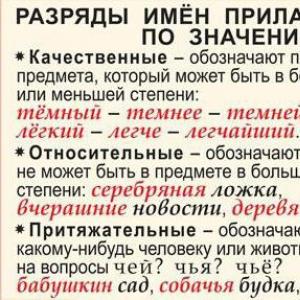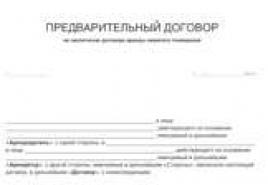Sentence with a single gerund. Isolation of adverbial verbs. In what cases is the adverbial phrase not separated by commas?
As many people know, the participial phrase has the meaning of an additional predicate, therefore it is isolated and separated by commas. This usually does not cause difficulties for students. However, there are cases when the participial phrase does not need to be isolated. We will now consider these cases in more detail.
1. Participial phrase(most often this is a turn with the meaning of an adverbial manner of action) does not denote an additional action, but on the contrary, being closely connected with the predicate, it itself becomes the semantic center of the statement. In this case, it cannot be removed or moved without distorting or losing the meaning of the sentence.
He stood with his neck slightly craned, sad and thoughtful(the main thing is that he didn’t just stand, but stood with his neck slightly stretched).
She usually read with her head bowed and the tip of her tongue sticking out.(the point is how she read, not what she read at all).
This exercise must be done while sitting on the floor.(the point is exactly how this exercise is performed).
2. The participial phrase is a phraseological unit.
The boy hurried headlong to call the rescuers for help.
The printer worked tirelessly.
After receiving the news, the girl spent the night without closing her eyes.
Here are some of these phraseological units: carelessly, barely taking a breath, scream without taking a breath, rush with your tongue hanging out, lie staring at the ceiling, sit with bated breath, work with your sleeves rolled up, rush around without remembering yourself, listen with your ears hanging open, etc.
Some adverbial phraseological combinations act as introductory ones, then they are isolated.
To be honest, the exercise could have been done much better.
Apparently, you can already hit the road.
3. When there is an intensifying particle I before the participial phrase.
It was possible to report this without starting to quarrel.
A humble person remains humble even after defeating a strong enemy.
You can go home without waiting for the exam result.
 4. If the participial phrase is broken by the word included in a subordinate clause or in a simple sentence. This usually applies to subordinate clauses with a conjunctive word which. Also, similar cases can be found in some poetic texts.
4. If the participial phrase is broken by the word included in a subordinate clause or in a simple sentence. This usually applies to subordinate clauses with a conjunctive word which. Also, similar cases can be found in some poetic texts.
There was a door to the left, through which it was possible to get into the dressing room.
Jim Jarmusch's new film was released yesterday, and after watching it it is not difficult to understand his creative growth.
Raven, perched on the spruce tree, was just about ready to have breakfast, but became thoughtful... (I. A. Krylov).
But Shibanov, keeping his slavish loyalty, gives his horse to the governor (A.K. Tolstoy).
5. A gerund may lose its verbal meaning, then it is not separated by commas. Usually in such cases it can be omitted without affecting the meaning of the sentence.
The post office is located not far from Vosstaniya Square.
Universities have been accepting applicants under new rules since the end of last year
You can start the task starting tomorrow(the word starting can be omitted, the structure and meaning of the sentence will not change).
However, if the turn with the word beginning is not associated with the concept of time or serves to clarify, clarify, then it is isolated.
Everything seemed suspicious to us, starting with his intonation
The captain, starting from the Crimean War, participated in all military operations except Japanese(the word starting cannot be omitted, the structure and meaning of the sentence will change).
Revolutions based And depending on in most cases they are not included in the participial construction and are not isolated.
The task is compiled based on your wishes.
We will act according to the circumstances.
6. The participial phrase appears together with the usual non-isolated circumstance and they are homogeneous. In this case, the participial phrase is not separated by commas.
We will teach you how to solve examples and problems with ease and without resorting to reference books.
The boy ran quickly and without looking back.
The second lieutenant answered in without embarrassment.
without embarrassment.
However, in this case, isolation is possible if the author wants to put a semantic emphasis or give a related explanation.
A little guilty and sobbing, mother psaid goodbye to Alyosha.
In the dark sky, tired and not sparkling, yellow droplets of stars appeared (M. Gorky).
As you can see, not everything is simple with punctuation marks in adverbial phrases, but we hope our explanations helped you. If something remains not entirely clear, you will always find help from our tutors!
Good luck to you and a beautiful, competent, understandable Russian language!
blog.site, when copying material in full or in part, a link to the original source is required.
1. Participial phrases, as a rule, are isolated, regardless of their location in relation to the predicate verb.
For example: Reaching for the beams, shaking their heads, schools of horses(Ser.); Without putting on a cap, went out onto the porch(Shol.); Having gotten drunk overnight, the forest sank and fell silent, drooping wet pine branches(Sparrow); Leaning back on a comfortable, soft chair back in a trolleybus, Margarita Nikolaevna was driving along Arbat(Bulg.); Lisa, looking at Nikolai Vsevolodovich, quickly raised her hand(Adv.); After[Anna] pushed off with sticks and ran through the thickets, leaving behind swirls of snow (Paust.).
Circumstances expressed by gerunds and participial phrases have the additional meaning of predicativity, characteristic of the gerund as a verbal form. Therefore, gerunds and participial phrases are often perceived as additional predicates.
For example: My friend and I returned to our compartment. old lady, putting the book down and trying to ask something, didn’t ask and started looking out the window(Spread) (compare: The old woman put the book down and tried to ask something, but she never did..).
However, gerunds and participial phrases are not always able to be replaced by conjugated forms of the verb. They denote different signs of action and can be replaced by separate participial phrases with additional adverbial meaning.
For example: Doctor, not knowing how to talk to crying women, sighed and walked quietly around the living room. “Doctor,” couldn't talk to crying women, sighed and quietly walked around the living room(Ch.).
It is the presence of an adverbial connotation of meaning that functionally brings together adverbial and participial phrases.
Many adverbial participles and adverbial phrases that have adverbial meaning can be compared with the subordinate parts of complex sentences.
For example: Judging by his hesitant movements, by the expression of his gloomy face, which was dark from the evening twilight, he wanted to say something(Ch.) (compare: Judging by his hesitant movements...)
2. The participial phrase located after the coordinating conjunction, subordinating conjunction or allied word is separated from it by a comma, despite the absence of emphatic intonation(intonationally, the conjunction is included in the turnover).
For example: And Korney turned slightly on the beam and, watching with a thoughtful gaze the flashing horseshoes of the harness, starts talking(Boon.); The prince told me that he, too, would work and that, having earned money, we would go by sea to Batum(M.G.); In the pocket of his riding breeches, Sergei felt shag crumbs and, gently shaking its contents into your hand, rolled up a thick clumsy cigarette(Sparrow).
Depending on the context, the conjunction a can either be included in the participial construction or connect members of the main sentence.
For example: We must understand the essence of perestroika-consciousness, and having understood this, join in the active struggle for it. – We must understand the essence of the restructuring of consciousness, and, having understood this, we must not be content with just verbal calls for it.
3. When combining adverbial constructions, punctuation marks are placed in the same way as with homogeneous members of the sentence.
For example: He went, staggering and still supporting his head with the palm of his left hand, and with his right hand quietly tugging at his brown mustache (M.G.).
If adjacent participial phrases refer to different predicate verbs and conjunctions and are not included in their composition, then they stand out as independent constructions.
For example: He stood, leaning against a pile of tea cups, And, looking around aimlessly, drummed his fingers on his cane like a flute(M.G.) ( he stood and drummed).
Participial phrases located in different parts of the sentence are formed independently.
For example: Sergey, after standing for another minute, slowly walked towards the pile of coal and, carefully laying out the overcoat on the floor, sat down on a large piece of anthracite(Sparrow) ( Sergei headed... and sat down); Pushing the door with your chest, Sergei jumped from the house and, not paying attention to the dry bushes tearing the body and the pine branches whipping in the face, ran, panting, forward into the very thicket of the forest(Sparrow) ( Sergei jumped and ran);Cars, tapping on the rail joints, lazily moved behind the locomotive and, clanking their buffers, became silent again(Sparrow) ( The carriages moved and became silent);Scattering, like a flying witch, smoky braids, crimson illuminated from below, the south-eastern express rushed in the distance, crossing the highway(Boon.) ( The South-Eastern Express was rushing along).
4. Restrictive particles only, only those standing before adverbial constructions, are included in their composition.
For example: So she lived without love, just hoping for her.
The same is true in the presence of comparative conjunctions that begin the adverbial construction. For example: Along the dark stairs... two walked, then three... hesitating and lingering everywhere, as if afraid to get down to business (Fed.).
5. Single gerunds are isolated while maintaining their verbal meaning. The conditions for their isolation are the same as for participial phrases.
For example: The waves played, and Shakro, sitting on the stern, disappeared from my eyes, sinking along with the stern, then rose high above me and, screaming, almost fell on me(M.G.); It's charming to lie face up, watching the stars light up(M.G.); Whispering, as if dancing, grandfather appeared(M.G.); At first, even in the car, we moved at walking speed, every now and then we scraped the differential and, backing away, went around stones(Hall.); The doors creaked and closed. Darkness filled the carriage. Only the moon, curious, looked out the window(Sparrow); Having gotten used to it, my eyes made out a pile of bodies on the cement floor(Sparrow).
6. Single gerunds and participial phrases are not isolated:
1) if the gerund has lost its verbal meaning.
For example: Horses run slowly among green hilly fields(Boon.); Sergei lay motionless for a long time(Sparrow);
2) if d her participle is included in stable circulation: work tirelessly; run with your tongue out; run headlong; listen with bated breath; listen with open ears.
For example: In difficult days, he worked tirelessly with us(Nick.);
3) if the participle or participial phrase appears among the homogeneous members of the sentence along with other parts of speech.
For example: He said in a whisper and without looking at anyone; Klim Samgin walked down the street cheerfully and without giving way to oncoming people (M.G.);
4) if the adverbial construction acts as an adverbial modifier of action and is closely adjacent to the predicate verb(its function is similar to that of an adverb).
For example: This exercise do while sitting on a chair; This exercise is done standing. Compare, however, with increased verbosity: The engineer, lying down, read his mining art(Fad.) ( the engineer lay and read).
7. Single gerunds may or may not be isolated, taking into account the context.
For example, when acquiring the meaning of clarification, the gerund is isolated: The children were constantly making noise, never stopping(compare: the children made noise incessantly).
The isolation or non-isolation of a gerund may depend on the meaning of the predicate verb (a non-isolated gerund can be replaced by an adverb).
For example: Shel do not stop (walked non-stop); I asked do not stop (the gerund denotes the second action - asked, but did not stop to do so).
The isolation or non-isolation of a gerund is also influenced by its location; compare: He walked along the garden path without looking back. - Without looking back, he walked along the garden path.
8. Isolation or non-isolation of a gerund may depend on its type. Thus, participles ending in -а, -я, more often express the meaning of the circumstance of the manner of action and therefore are not isolated.
For example: She came in smiling(compare: Smiling, she entered the room; She came in smiling at your secret thoughts ).
Participles ending in -в, -вшы, convey other shades of adverbial meanings (reason, time, concession), which contribute to isolation.
For example: She screamed, frightened; Frightened, she screamed.
9. Turns of phrases despite, in spite of, despite, based on, starting from, thanks to, after, performing the function of derived prepositions and prepositional combinations, are isolated or not isolated according to the conditions of the context.
Phrases with the words despite, in spite of, are isolated.
For example: Despite the bad weather, we set off; At the meeting they criticized regardless of faces; Sleepy, like a branch drowned in a pond of sleep, Ney carried in her arms a magnificently sleeping son, scattered despite its small size, heroic legs and arms(Color); Despite the doctors' ban, I wrote the story “Colchis” in Maleevka(Paust.); Science must be done with clean hands.
The phrase with the words despite is not isolated only in the case of a close semantic connection with the verb, and in postposition.
For example: He is did it despite doctors' ban (compare: Despite the doctors' ban, he did it).
Phrases with words starting from, depending on, after, acting in the meaning of prepositions, are not isolated.
For example: Let's act depending on the circumstances (compare: act according to circumstances);Starting Tuesday the weather changed dramatically(compare: The weather has changed dramatically since Tuesday); After some time Vesovshchikov came(M.G.).
If these phrases have the meaning of clarification or accession, then they are separated.
For example: We will act skillfully and quickly, depending on the circumstances; Last week, starting from Tuesday, the weather changed dramatically.
A turn of phrase with words based on can have two meanings: with increased verbality, when the action denoted by it correlates with the subject, it is isolated; in the absence of such a connection, it is not isolated.
For example: It turns out that not only we, who suddenly discovered the need for a new science - bionics, strive to learn, understand and make the most advantageous use of the properties of living nature; our ancestors did this long before us, based on your knowledge and needs (Chiv.). Compare: He developed a house project. – The project has been developed based on planned cost.
The phrase with the word thanks is isolated or not isolated depending on the degree of prevalence and location.
For example: Thanks to the rains the ground was saturated with moisture. - Earth, thanks to the rains, soaked in moisture.
Circumstances expressed by nouns and adverbs
1. Circumstances expressed by nouns in the forms of indirect cases can be isolated for incidental explanation or semantic emphasis.
For example: And Natasha, with painful surprise, looked at the dressed-up people(Boon.); I walked and walked on the cold and damp sand, trilling with my teeth in honor of hunger and cold, and suddenly, in a vain search for food, going behind one of the stalls, I saw behind him a figure crumpled on the ground in a pathetic dress(M.G.); One of the spots, in the center of the pattern, looked very much like the head of the owner of the chair(M.G.); The small city, immersed in greenery, when looking at it from above, made a strange impression...(M.G.); The rafts sailed on among darkness and silence (M.G.); When evening came, I out of anger at your failures and at the whole world, decided on a somewhat risky thing...(M.G.); At night, against the stronger wind, the detachment was heading to the port to land(Plat.); In eleven years, during daily driving I've probably had a lot of interesting adventures(Ch.).
Such circumstances usually carry additional semantic load and are synonymous with verbal constructions (compare examples: ...because he was angry at his failures and at the whole world; ...as I drove every day).
2. Most often, explanatory adverbial members of a sentence contain derived prepositions and prepositional combinations (in spite of, in view of, in order to avoid, as a result of, on occasion, for the reason of, in the presence of, in accordance with, in contrast to, in contrast to, due to, due to absence, regardless of, etc.), manifesting their specific circumstantial meaning and giving them the form of turns.
For example: A rotten, gray-blue balcony from which, due to the lack of steps, it was necessary to jump, drowned in nettles, elderberries, euonymus (Bun.); Lonely and unnecessary because of this peace, the peaceful sound of chewing horses, due to the desert, imprinted in the darkness and there is silence again(Ser.); Metelitsa silently, mockingly stared at him, holding his gaze, slightly moving his satin black eyebrows and with his whole appearance showing that, no matter, what questions they will ask him and how they will force him to answer them, he will not say anything that could satisfy those asking(Fad.); But, contrary to possibility, the sun came out bright red, and everything in the world turned pink, turned red(Sol.).
Given the low prevalence of such sentence members, variations in their punctuation are possible, dictated by different word orders.
Phrases with derived prepositions and prepositional combinations are necessarily separated,if they are located between the subject and the predicate : breaking their direct connection and contributes to the release of revolutions. The same thing happens when the natural connection between the controlling and controlled words is broken. In other positions, especially in less common sentences, such phrases do not complicate the sentence with special emphatic intonations and may not be isolated (without a special task for this).
For example: To avoid gas leakage The faucet is turned off. – Disabled, to avoid gas leakage, tap; He did it out of habit. - He, by force of habit, did it; According to the order the group was disbanded. - Group, according to the order, disbanded; In the absence of corpus delicti the case was dismissed. - Case, for lack of corpus delicti, discontinued.
3. Circumstances expressed by nouns may be highlighted with a dash if there is a need for special emphasis on such circumstances.
For example: At our last meeting, Oleg asked to bring a general notebook with hard “crusts” - for taking notes while lying down (gas.); It[creative imagination] created science and literature. AND - at great depths– the creative imagination of at least Herschel, who discovered the majestic laws of the starry sky, and the creative imagination of Goethe, who created “Faust”, largely coincide with each other(Paust.); Poor poets - in lightning, in storms and thunder– sang inspired songs about the charm of friendship, noble impulses, freedom and courage(Paust.); Immediately after the birth of the boy, Dyakonov ordered Schwalbe to adopt him and give him the surname Koporsky at baptism - at the place of birth of the boy in the city of Koporye, near Oranienbaum (Paust.).
4. In special cases, for semantic emphasis, some circumstances expressed by adverbs may be isolated (with or without dependent words) . The conditions for their isolation are the same as those for circumstances expressed by nouns in indirect cases.
For example: He stood in front of me, listened and suddenly, silently, baring his teeth and squinting his eyes, rushed at me like a cat(M.G.); Misha put the book aside and, not immediately, quietly answered(M.G.); And so, unexpected for everyone, I passed the exam brilliantly(Cupr.).
Usually, when isolating circumstances expressed by adverbs, commas are used, however, as in other cases, in order to more strongly highlight the circumstances, dashes are possible.
For example: The boy sniffed in embarrassment and disbelief, but, realizing that there was nothing terrible, and everything, on the contrary, was turning out terribly fun, he wrinkled his nose so that his nose turned up, and also - quite childish- burst out mischievously and thinly(Fad.).
Isolation (highlighting with commas) of circumstances depends, first of all, on the way they are expressed.
A) Circumstances expressed by gerunds
1. Circumstances expressed by gerunds (you can ask morphological questions to the gerunds doing what? what did you do?) and participial phrases (that is, participles with dependent words), as a rule, are isolated regardless of the place they occupy in relation to the predicate verb:
Example: Arms spread wide, a grimy bulldozer driver is sleeping(Peskov). Ksenia had dinner spreading a scarf on the rod (Peskov).
If a circumstance expressed by a gerund and a participial phrase is in the middle of a sentence, then it is separated by commas on both sides:
And then to the cliff, leaving my bulldozer, Nikolai ran up(Peskov). The bird, shuddering, picked up its wings(Permitov).
Isolated circumstances, expressed by gerunds and participial phrases, are close in meaning to the secondary predicate (but are never independent predicates!). Therefore, they can be replaced by subordinate clauses or independent predicates.
Wed: And then to the cliff, leaving my bulldozer, Nikolai ran up. - Nikolai left his bulldozer and ran to the cliff. The bird, shuddering, picked up its wings. - The bird shuddered and picked up its wings.
Note!
1) Restrictive particles are only included inside a separate structure and are released along with it.
A match was struck only for a second illuminating the man's face.
2) The participle and the participial phrase standing after the coordinating or subordinating conjunction / allied word are separated from it by a comma (such a phrase can be torn off from the conjunction, rearranged to another place in the sentence, or removed from the sentence).
Wed: He threw down the pen and leaning back in the chair, began to look at the moonlit clearing(Permitov). - He dropped the pen and began to look at the moonlit clearing; Life is arranged in such a way that without knowing how to hate, it is impossible to sincerely love(M. Gorky). - Life is arranged in such a way that it is impossible to truly love, not knowing how to hate.
3) A conjunction or a conjunctive word is not separated by a comma from a gerund and a participial phrase in the event that the participial construction cannot be torn away from the conjunction or conjunctive word or removed from the sentence without destroying the structure of the sentence itself. This is most often observed in relation to the coordinating conjunction a.
Wed: He tried to read books unnoticed, and after reading them, he hid them somewhere(impossible: He tried to read books unnoticed, but hid them somewhere); But: He did not name the author of the note, but, having read it, put it in his pocket. - He did not name the author of the note, but put it in his pocket.
Two homogeneous gerunds or participial phrases connected by single coordinating or disjunctive conjunctions and, or, or, are not separated by a comma.
The telephone operator sat, hugging his knees and leaning your forehead on them(Baklanov).
If a conjunction connects not two gerunds, but other constructions (predicates, parts of a complex sentence, etc.), then commas are placed in accordance with the rules for placing punctuation marks for homogeneous members, in a complex sentence, etc.
Wed: 1. I took the note and, after reading it, put it in my pocket. Single conjunction and connects predicates ( took it and stuck it) and a comma is placed after the conjunction;
2. He stopped, thinking about something, And , turning around sharply, called the sentry. A single conjunction connects two predicates ( stopped and called). Circumstances - participial phrases refer to different predicates ( has stopped , thinking about something; called, turning around sharply ). Therefore, they are separated on both sides by commas from other members of the sentence.
2. Not isolated circumstances expressed by gerunds and participial phrases, in the following cases:
The participial phrase is a phraseological unit:
He worked carelessly; He ran headlong.
Note. Most often the following phraseological units are not distinguished in texts: run headlong, run headlong, work carelessly, work with sleeves rolled up, work tirelessly, sit back, rush with your tongue out, listen with bated breath, scream without taking a breath, lie staring at the ceiling, rush about without remembering yourself, spend the night without closing your eyes, listen with your ears hanging open. But if such a phraseological unit is an introductory word ( in all honesty, to be honest, frankly speaking, in short, apparently), then it is separated by commas, for example: Apparently, he had no intention of helping me; In short, we will have to do everything ourselves.
before the gerund there is an intensifying particle and (not a conjunction!):
You can live and without bragging about your intelligence;
Note!
The participle in modern Russian is never predicate, therefore verb and gerund cannot be homogeneous members!
The gerund is part of a subordinate clause and has the conjunctive word which as its dependent. In this case, a comma only separates the main clause from the subordinate clause, and there is no comma between the gerund and the conjunctive word:
We face the most difficult tasks, without deciding which we will not be able to get out of the crisis;
The participial phrase includes the subject.
In this case, the comma only separates the entire phrase from the predicate, and the subject and the gerund are not separated by a comma. Such constructions are found in poetic texts of the 19th century:
Crow perched on a spruce tree, had breakfast I'm just about ready...(Krylov); compare: Crow, perched on a spruce, got ready to have breakfast;
The participle acts as a homogeneous member with a non-isolated circumstance and is connected with it by the conjunction and:
He walked quickly and without looking around.
3. Not isolated participle constructions and single participles that have lost their verbal meaning. These are the most difficult cases for punctuation analysis. They require special attention to the meaning of the gerund, to the context in which the gerund is used, etc.
Participles and adverbial phrases that have finally lost their verbal meaning, have become adverbs, or have acquired adverbial meaning in a given context are not distinguished:
She looked at me without blinking(it is forbidden: looked and didn't blink); We drove slowly(it is forbidden: we drove and were in no hurry); The train was coming do not stop (it is forbidden: walked and didn't stop); He answered while sitting(it is forbidden: he answered and sat); He walked with his back bent(it is forbidden: he walked and bent).
Such single participles, less often - participle phrases, are usually circumstances of the manner of action (answer questions How? how?), merge with the predicate into one whole, are not separated from the predicate by a pause and most often stand immediately after the predicate:
looked silently, looked smiling, listened with a frown, spoke while yawning, chatted incessantly, sat ruffled, walked bent over, walked stumbling, walked with a limp, walked with his head bowed, wrote with his head bowed, entered without knocking, lived without hiding, spent money without counting and etc.
Often such gerunds can be replaced by adverbs, nouns with and without prepositions.
Wed: He spoke about this smiling. - He spoke about this with a smile; The train was coming do not stop. - The train went without stops.
In all such uses, the gerund indicates not an independent action, but an image of the action expressed by the predicate.
For example, in the sentence: He walked bent over- one action ( walked), and the former gerund ( bent over) indicates a mode of action - a characteristic posture when walking.
If in this context the verbal meaning is preserved, then a single participle or participial phrase is isolated. Usually in this case there are other circumstances with the predicate verb; The participle takes on the meaning of clarification, explanation and is intonationally highlighted.
Wed: He walked without looking back. - He walked hastily, without looking back.
The increase in verbosity in gerunds can be facilitated by the degree of prevalence of gerunds.
Wed: She sat waiting. - She sat waiting for an answer.
Not isolated former gerunds that have lost connection with the verb and have become function words: starting from (meaning “from such and such a time”), proceeding from (meaning “based on”), depending on (meaning “in accordance”) :
Everything has changed since last Monday; The estimate is based on your calculations; Act depending on the circumstances.
However, in other contexts the turns may become isolated:
turns with words starting with are isolated if they are in the nature of clarification, explanation and are not associated with the concept of time:
The word beginning in such contexts cannot be eliminated without damaging the meaning of the sentence;
a phrase with the words proceeding from is isolated if in meaning it correlates with the producer of the action, which can “come from something”:
We have drawn up an estimate based on your calculations (we based on your calculations);
turns with words, depending on the type, are isolated if they have the meaning of clarification or accession:
I had to act carefully, depending on the circumstances (clarification, you can insert “namely”); Vacation can be used to practice various sports, depending on the time of year (joining).
B) Circumstances expressed by nouns
1. Always separate circumstances of the assignment expressed by nouns with prepositions despite, despite. Such phrases can be replaced by subordinate clauses of concession with the conjunction although.
Wed: Despite the rainy summer, the harvest turned out to be excellent(Pochivalin). - Although the summer was rainy, the harvest was excellent; Despite heavy shelling, Fedyuninsky rose to his observation post. - Although the shelling was strong, Fedyuninsky rose to his observation post.
2. Can become isolated circumstances:
reasons with prepositions and prepositional combinations thanks to, as a result of, in view of, for lack of, for the absence of, according to, by virtue of, in connection with, for the reason of, on occasion etc. (can be replaced by a subordinate clause with the conjunction since).
Wed: Savelich, agrees with the coachman's opinion, advised to return. - Since Savelich agreed with the coachman’s opinion, he advised to turn back; Children, due to being young, no positions have been identified(Turgenev). - Since the children were small, they were not assigned any positions;
concessions with prepositions in spite of, with (can be replaced with a subordinate clause with the conjunction although).
Wed: His life despite the gravity of his situation, went easier, slimmer than Anatole’s life(Herzen). - Although the situation was difficult, his life was easier, more harmonious than Anatole’s life; Contrary to his instructions, the ships were put out to sea early in the morning(Fedoseev). - Although he gave instructions, the ships were taken out to sea early in the morning.
conditions with prepositions and prepositional combinations if present, if absent, in case etc. (can be replaced by a subordinate clause with the conjunction if).
Wed: workers, in case of refusal, decided to go on strike. - If the workers are refused, they decide to go on strike;
goals with prepositions and prepositional combinations in order to avoid (can be replaced by a subordinate clause with the conjunction so that).
Wed: Money, to avoid delay, translate by telegraph. - To avoid delays, transfer money by telegraph;
comparisons with the conjunction like.
Wed: Nikolai Petrovich was born in the south of Russia, like his older brother Paul (Turgenev).
However, phrases with such prepositions and prepositional combinations may not be isolated.
More often, phrases that are located between the subject and the predicate are isolated:
Savelich, agrees with the coachman's opinion, advised to return.
In addition, isolated phrases are usually common, that is, they contain a noun with dependent words:
Thanks to great weather and especially holiday, the street of the village of Maryinsky came alive again(Grigorovich).
As a rule, the indicated phrases at the end of the sentence are not isolated.
Wed: workers, as directed by the master, headed to the next workshop. - The workers went to the neighboring workshop as directed by the master.
In general, the isolation of phrases with the indicated prepositions and prepositional combinations is optional.
3. Circumstances expressed by nouns, without prepositions or with other prepositions, are isolated only if they acquire additional semantic load, have an explanatory meaning or combine several adverbial meanings (temporary and causal, temporary and concessional, etc.).
For example: Peter, after he received a decisive refusal, went to his room(L. Tolstoy).
In this case, the circumstance combines the meanings of time and reason ( when did you leave? And why did he leave?). Please note that the phrase is expressed by a noun with dependent words and is located between the subject and the predicate.
Note!
Isolated circumstances expressed by nouns are always highlighted intonationally. However, the presence of a pause does not always indicate the presence of a comma. Thus, the circumstances that appear at the beginning of the sentence are always emphasized intonationally.
Wed: I was in St. Petersburg last year; Last year / I was in St. Petersburg.
However, a comma is not placed after such a circumstance!
C) Circumstances expressed by adverbs
Circumstances expressed by adverbs (with dependent words or without dependent words) are isolated only if the author wants to draw attention to them, if they have the meaning of a passing comment, etc.:
A moment later into the yard, unknown where from, a man ran out in a nankeen caftan, with a head as white as snow(Turgenev).
|
Separate themselves |
Not isolated |
|
1. Participles with dependent words, as well as two or more participles related to one verb: 1) Holding the jug above her head, the Georgian woman walked along a narrow path to the shore. Sometimes she slid between the stones, laughing at awkwardness his. (L.); 2) The sun, hidden behind a narrow bluish cloud, gilds its edges. (New-Pr.); 3) From the Urals to the Danube, to the big river, the regiments are moving, swaying and sparkling. (L.) |
1. Participles with dependent words, which have turned into stable figures of speech that have become sensible expressions (usually they come after the verb to which they refer: carelessly, rolling up sleeves, headlong, without taking a breath, etc.): 1) The boy ran headlong (very quickly); 2) We will work with our sleeves rolled up (unitedly, persistently). But: The father rolled up his sleeves and washed his hands thoroughly. |
|
2. Single gerunds, if they do not have the meaning of an adverb (usually they come before the verb): 1) Having made some noise, the river calmed down and returned to its banks. (Floor.); 2) The roar, without stopping, rolls on. (CM.); 3) The steppe turned brown and began to smoke, drying out. (V.Sh.) |
2. Single gerunds, having the meaning of a simple adverb, acting as an adverb of the manner of action (usually they come after the verb): 1) Yakov walked slowly (slowly). (M.G.); 2) He talked about the walk laughing (cheerfully). |
|
3. Participles with dependent words, closely merging in meaning with the verb: The old man sat with his head down. What is important here is not that the old man was sitting, but that he was sitting with his head down. |
|
|
4. Groups of homogeneous members, consisting of an adverb and a gerund: The boy answered questions frankly and without any embarrassment. |
|
|
Participles and participial phrases connected by a conjunction and, like other homogeneous members, they are not separated from each other by a comma: I looked back. At the edge of the forest. With one ear attached and the other raised, the hare jumped over. (L.T.) In all other cases, gerunds and participial phrases are separated by a comma from the conjunction preceding or following them and: 1) The batteries gallop and rattle in a copper formation, and... smoking, as before a battle, the wicks burn. (L.) 2) " Eagle* finally went, having developed a move, and, having caught up with the squadron, took his place in the ranks. (New-Pr.) |
|
Isolation of circumstances expressed by nouns
1. Circumstances of concession expressed by nouns with a preposition despite, are separated: 1) Despite the difference in characters and the apparent severity of Artyom, the brothers loved each other deeply. (BUT.); 2) The next morning, despite the owners' begging, Daria Alexandrovna got ready to go. (L. T.); 3) The day was hot, bright, radiant, despite the occasional rain. (T.)
2. Isolation of other circumstances expressed by nouns with prepositions is not mandatory. Isolation depends on the intentions and goals of the author, as well as the prevalence or non-prevalence of the circumstances and their place in the sentence. More common circumstances are isolated more often than less common ones; circumstances occurring at the beginning or middle of a sentence (before the predicate) are isolated more often than those at the end of the sentence: Due to the lack of a room for those arriving at the station, we were given overnight accommodation in a smoky hut. (L.) But: He didn’t go to the cinema due to lack of time. Circumstances isolated in this way are closer in meaning to subordinate clauses.
Most often, the following circumstances are isolated: 1) circumstances of reason with prepositions thanks to, according to, in view of, as a result of or with prepositional combinations for the reason, by chance, for lack of, due to etc.: I went by postal service, and he, due to heavy luggage, couldn't follow me. (L.); 2) circumstances of the condition with prepositional combinations in the presence, in the absence, provided, etc.: Yacht racing, subject to favorable weather, will take place next Sunday; 3) the circumstances of the concession with the pretext contrary to: Our parking lot is in Kamrang Bay, contrary to the expectations of many, dragged on. (New-Pr.)
An isolated circumstance, expressed by an adverbial phrase, is always highlighted in speech with commas and answers certain questions given in this article. There are also exceptions for isolating adverbial phrases in sentences with examples.
What is an isolated circumstance expressed by an adverbial phrase?
In russian language isolated circumstance expressed by an adverbial phrase, is a minor member of the sentence, represented by a gerund with dependent words. It denotes a sign of action, depends on the predicate verb and is always highlighted in writing with commas. Answers the questions - When? How? How? For what purpose? and etc.
Examples of sentences with isolated circumstances with adverbial verbs:
Moving the furniture, we freed up space (freed up - how? - moving the furniture). Guys, hiding from the rain in a hut, discussed what they saw (discussed - when? - sheltered from the rain). Mom went to bed kissed my son goodnight(went to bed - when? - kissing my son).
Exceptions when isolating adverbial phrases in a sentence
An isolated circumstance can be represented by two homogeneous adverbial phrases or an adverbial phrase with a single participle, which are used through a conjunction And. In this case, commas highlight the entire circumstance, and not each adverbial phrase separately.
Examples: Girl, evoking a song And dancing, walked through the park. Greeting your opponent and shaking each other's hands, the athletes prepared for the match.
In addition, the circumstances expressed by the participial phrase are not isolated:
- If the participial phrase is part of a phraseological expression.
Examples: They worked tirelessly all day. Worried about her brother, she spent the night without closing my eyes.
- If the participial phrase contains a conjunctive word which.
Examples: Masha drew up an essay plan, following which she will write an interesting story. Seryozha had many friends, communicating with whom he learned a lot of new things.
Article rating
Average rating: 4.4. Total ratings received: 54.







